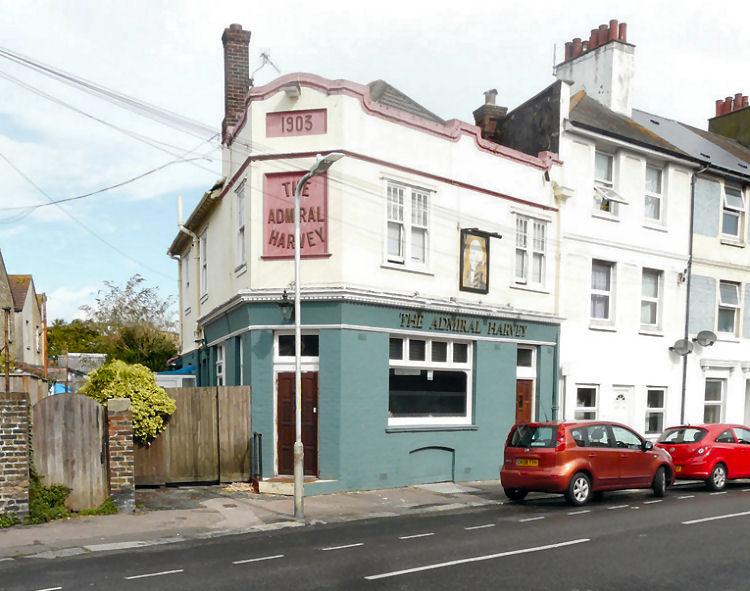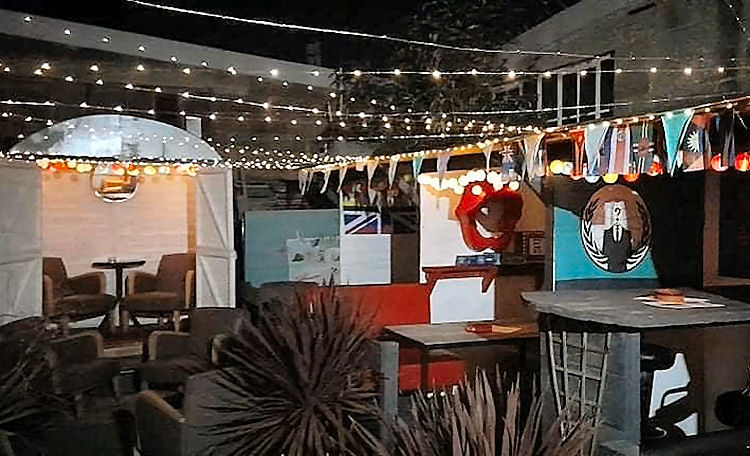|
13 Bridge Street (36 in 1861 ) )
15 Bridge Street in 1901

Dover
07719 374780
https://whatpub.com/admiral-harvey
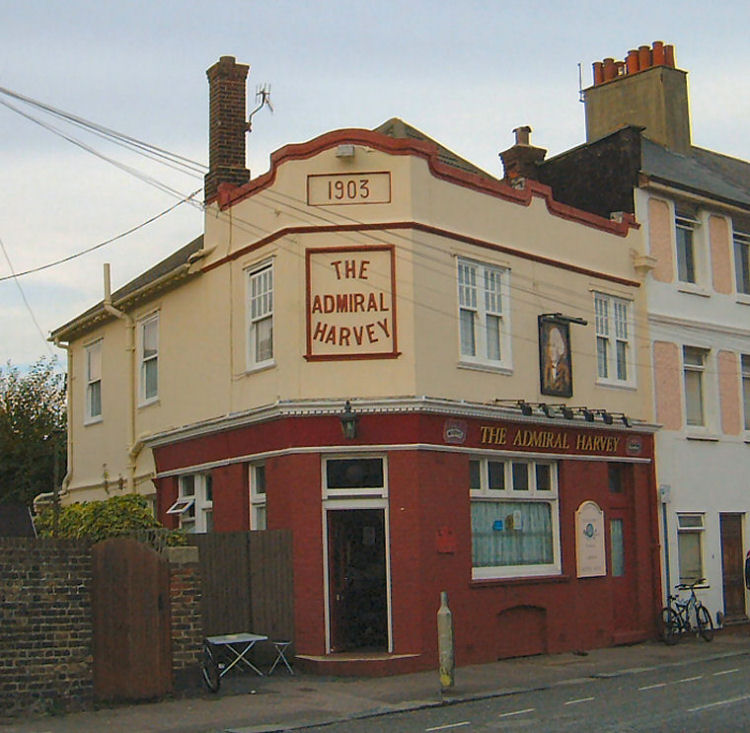 |
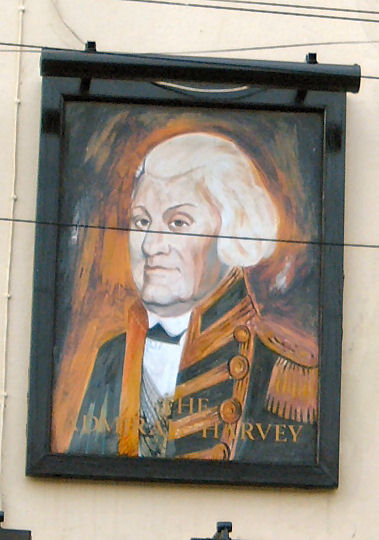 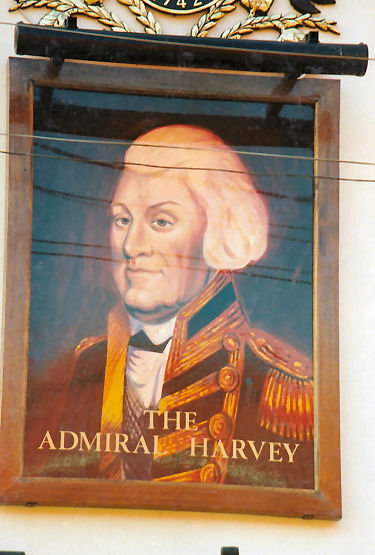 |
|
Photo left by Paul Skelton 6 Oct 2007. Right August 1991, with thanks from Brian Curtis
www.innsignsociety.com |
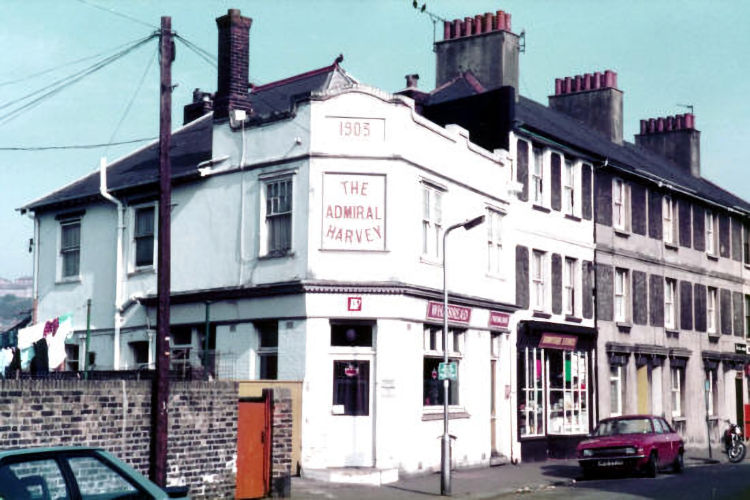
Above photo, 1983. |
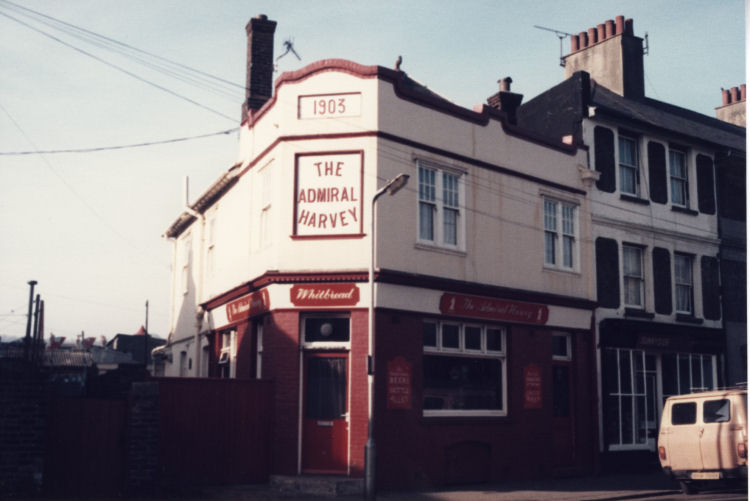
The Admiral Harvey 1987 (Photo by Paul Skelton) |
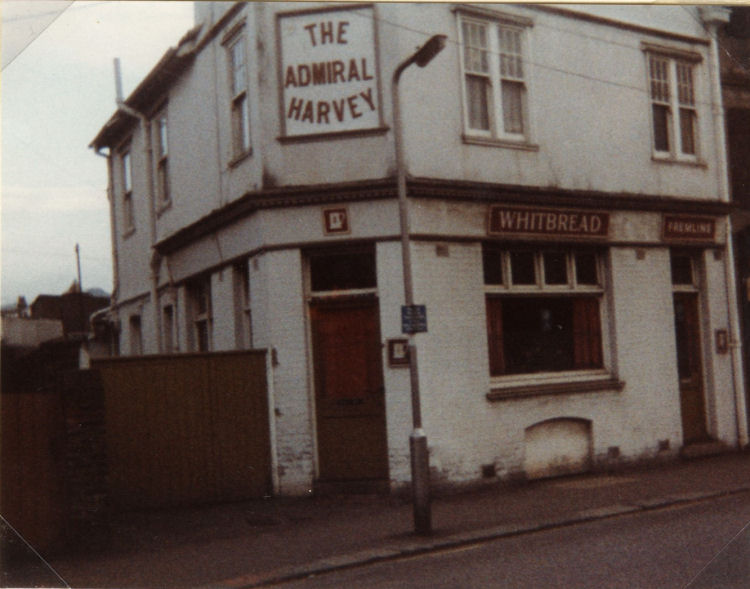 |
|
Above photo circa 1980, photos by Barry Smith. |
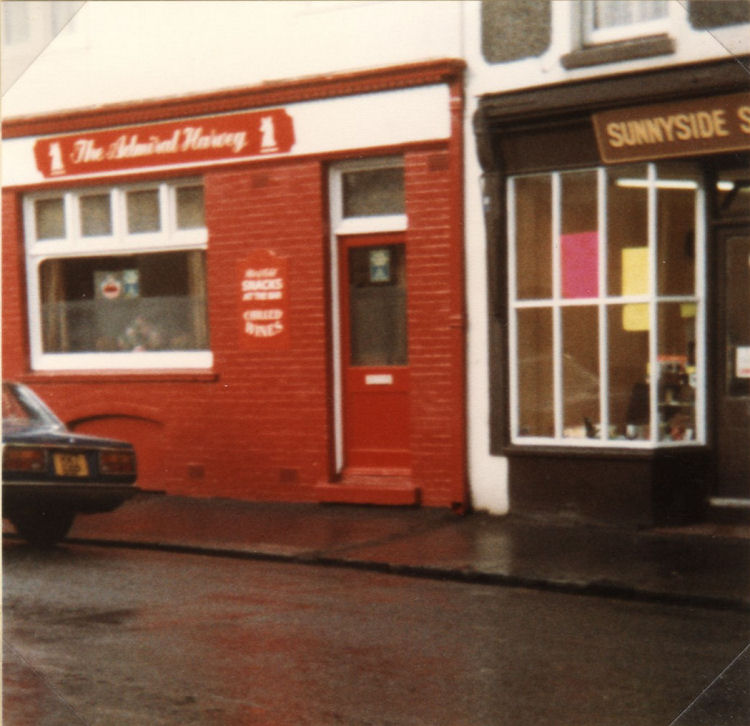
Above photo late 1980s by Barry Smith. |
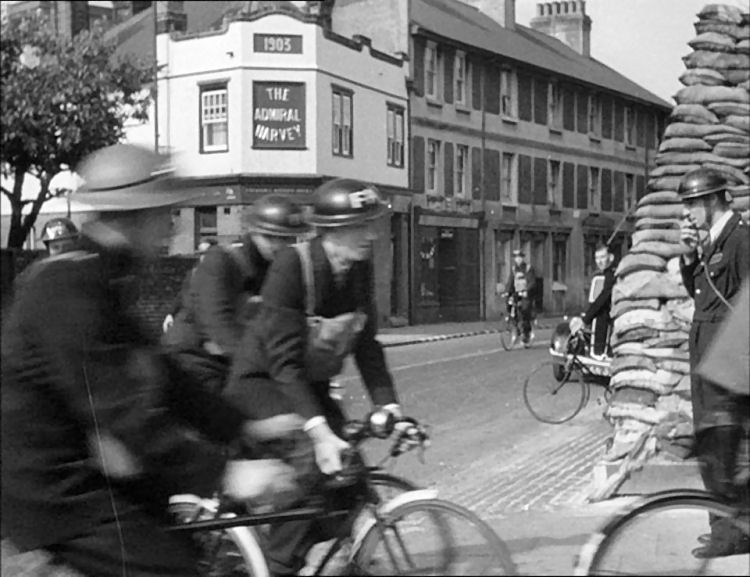 Above photo showing the Admiral Harvey circa 1940.
|
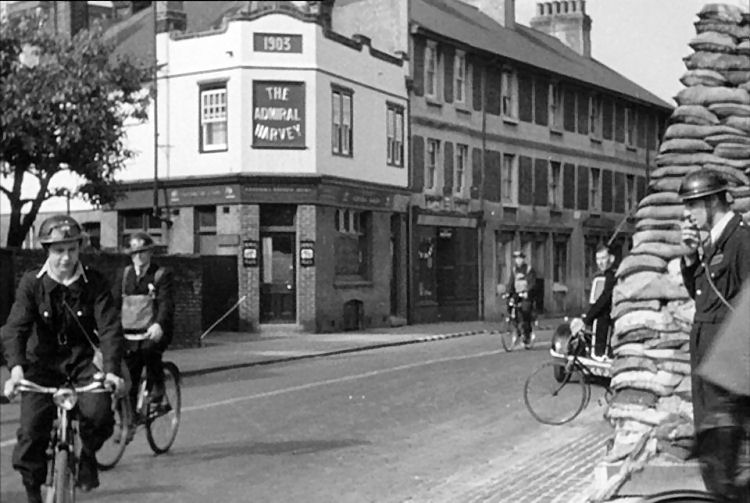
Above photo showing the Admiral Harvey circa 1940. |
The pub is named after Sir Eliab Harvey (1758-1830) a descendant of the
anatomist, William Harvey, who discovered the circulation of blood. Sir
Eliab commanded the Fighting Temeraire at Trafalgar and was made admiral in
that year, 1805.
The bridge which gave the street its name, was built in 1829. The houses
on the North side appeared about that time. According to the book
"Old Kent Inns" by Donald Stuart, 2006, he says the pub opened in 1829,
which was the same time as the bridge. The earliest mention I have
found so far is 1844 when the landlord was Henry Clements, who was called as
a witness to a murder of a policeman near the "Three Colts"
in the same year; at the time the premises was referred to as a beer-house.
This was well established by 1855, very much a country pub, and kept by Mr.
Care who supplemented his bar takings by the sale of dairy produce, largely
gleaned from his own surrounding pasture land and who gained a license in
1857. The annual fair used to be
held on part of those pastures and as it eventually attracted the
undesirable element of society, the magistrates were quick to point out that
the practice was putting his licence in jeopardy. Later, as the lands passed
to the Eagle estate, the keeper of that house received like warning.
|
South Eastern Gazette, 20 November, 1860.
Death From Drowning.
An inquest was held yesterday night week, at the "Red Lion Inn,"
Charlton, before W. H. Payn, Esq., borough coroner, on the body of a
young man named James Toms, found the previous night in the stream
near Charlton church. He appeared to have fallen into the water
shortly after nine o’clock, as the wash found in his pocket had
stopped at that time, and he had upon him £3 3s. 6d. in money, a
knife, comb, and other articles. He had been at the "Admiral Harvey"
public-house, with his brother and some other friends, with whom he
took some beer, as he was about to leave Dover, but he was quite
sober when he left to go home. It is supposed that he fell into the
river by accident in the darkness; there being no fence to protect
the public from slipping into the stream while walking along its
bank, which is therefore particularly dangerous in the dark. The
jury returned the following verdict:— "That the deceased was found
drowned, but how he came into the water there is no evidence to
show; and they requested the coroner to represent to the local
authorities the dangerous condition of the footpath in question,
with the view to some steps being taken for the greater security of
the public."
|
|
From the Dover Express and East Kent News, Friday,
11 September, 1868.
INQUEST BY THE BOROUGH CORONER.
On Friday afternoon last the borough coroner, W. H. Payn, Esq., held
an inquest at the "Admiral Harvey," Bridge Street, Charlton, on the body
of Charles Hogwood, whose sudden death on the morning of the previous
day, was engaged in unloading seed on the Commercial Quay for the Dover
Oil Mills, we briefly reported in out last.
From the evidence of the witness, it seemed that the deceased was in
tolerably good health, and was very sober in his habits. On the morning
named, according to the evidence of Charles Bishop, a labourer working
with the deceased on Thursday, Hogwood, while pushing a sack into the
cart, fell back onto the tail board, and by the time he was laid on the
ground he had struggled twice and died.
Dr Allan Duke deposed that he examined the deceased shortly after
death. There were no marks of violence on him, and he (the witness)
believed Hogwood died from disease of the heart.
The jury returned a verdict to that effect.
|
|
From the Dover Express and East Kent News, Friday, 28 August, 1874. Price 1d.
CORONERS INQUEST
An inquest was held on Monday last, at twelve o'clock, at the “Admiral
Harvey Inn,” Charlton, on the body of the infant child of Richard
Gatehouse, which was found dead in bedroom the Sunday morning previous.
The Jury having been sworn, and Mr. Charles Hadlow chosen foreman, the
following evidence was adduced:-
Richard Gatehouse: I am a costermonger, living in Colebran Street,
Charlton. The deceased Richard Gatehouse, was my first child, and he was
five months and three weeks old. I am a militia-man; and about a month
ago while on duty at Canterbury the child was taken ill. I took it to
the army doctor, who gave me some medicine, which appeared to do it
good, and it continued well after that time. On Saturday last the child
was put to bed and placed outside me and my wife. We both went to bed at
twelve o'clock at night. At half-past five on Sunday morning, I awoke
and went out into the back yard, and on my return on looking at the
child I found it was dead. I do not know the cause of its death; there
was plenty of room for three in the bed. The child was placed next to
its mother. I do not think the mother laid on the child. The child had a
“breaking out” before it died, and the same marks appear now as seen by
the Jury. I had some medicine from the chemists some time since, but it
has never had any sleeping draughts. My wife and me were both sober when
we went to bed. I last saw my child alive at twelve o'clock when I went
to bed. I awoke first in the morning, and afterwards called my wife.
Arthur Long, surgeon, at Buckland: On Sunday morning last, at eight
o'clock, I was called in to see the deceased Richard Gatehouse. I found
the child lying on the bed quite dead, and had been so for three or four
hours. There were no marks of violence on the body, and it appeared to
have been fairly nourished. The probably cause of death I believe to be
from suffocation. The bedstead was too narrow for three. I think it
probably that the child must have rolled against the mother, and thus
become suffocated. The eruption on the mouth and ear was before death,
but the discolouration down the left side came after death.
The Jury after a short consultation returned the following verdict:
“That deceased infant Richard Gatehouse was accidentally suffocated
while in bed with the father and mother.”
|
This lease expired in 1903 and plans to rebuild, at a provisional cost of
£1,000 were approved in January that year. Bridge Street was widened in
1903, at a cost of £500, which would have altered the numbers. They were
renumbered again, more intelligently it was said, in 1915. I point that out
because at different times the address will read otherwise. We mustn't
quarrel. Obviously progressed with some alacrity also because the new pub
opened whilst the old was still being pulled down. History tells us that a
bomb fell into this pub yard on 22 August 1917.
|
Dover Express 4th June 1909.
DOVER POLICE COURT – Tuesday. STEALING A BARROW.
Thomas Minter was charged with stealing from a yard in Peter Street a
coster’s barrow value 12/6d the property of Mr. Coles of the Admiral
Harvey public house, Bridge Street.
Mr. Coles said: I had a coster’s barrow which I bought on 1st May last
year. It was kept in Tucker’s yard which has an entrance from Peter
Street. He lent the barrow to Mr. Albert Dean in order that he might go
round with vegetables and afterwards wood. I have not seen the barrow
for some time, and the last time was when the boy was wheeling it in the
street. From what I heard I sent a message to the defendant to come and
see me about the barrow. He did not come and I then came down and saw
the Chief Constable and the Magistrates’ Clerk. The prisoner was
arrested and I saw the tray of the barrow yesterday and the wheels this
morning. It has all been taken to pieces. When I last saw it the barrow
was a going concern.
Cross examined: The prisoner did not come and ask the price of the
barrow. He came to the house and wanted some beer on trust. He never
lent the barrow to the prisoner. He understood that it had been a
planned job for a fortnight that they were going to take the barrow.
William Wall, landlord of the "New Endeavour," London Road, said: About
last Wednesday or Thursday, the prisoner came to me and asked me if I
wanted a pair of wheels and springs. He said that he would bring them up
and show them to me. He did so and I gave him 5/- for them. He said he
had been making a new top for them. The defendant is a labourer who does
nearly everything. I kept the wheels and springs until the police came
and fetched them away this morning.
Det. Sgt. Mount said: yesterday afternoon I went to 12 George Street
where the prisoner resides. I saw him and asked him if he had sold a set
of springs and a pair of wheels to a man named Wilson. At first he
replied “ I haven’t sold any wheels”, then he said “I did sell the
wheels and have some money to draw off Wilson, but I bought the barrow.
I asked him to allow me to look up the back of his garden. He did so and
I found the tray of the barrow lying flat on the top of the lodge.
Inside the lodge were the legs and side pieces of the barrow, and their
supports, all in pieces as they are now. The wheels and springs were
missing. I called in Dean, the man who the barrow was lent to. On
returning with Dean, I found the prisoner putting his coat on. He said
“You would not have had me had I known it”. Dean identified the portions
of the barrow. I told the prisoner I should take him into custody for
stealing a coster’s barrow from a yard in Peter Street the previous
week. He replied “I don’t care. Quite right”. I took him to the police
station. Mr. Coles was sent for and came and charged him. On being
charged, he said, in reference to the wheels and springs. “All right,
you’ve got to find them”. Subsequently I got the wheels from Mr. Wall.
The prisoner further said that he bought the barrow for 8/-. He denied
this. I got the wheels this morning from Mr. Wall’s premises in Lorne
Road.
Albert Dean, 16 Colebran Street, said that Mr. Coles bought the barrow
for his use. He did not authorise the defendant to take it. It was
missing from the yard one day last week. His son had used it on Saturday
the week before last.
The prisoner pleaded guilty and said that it would not have happened if
he had not had some beer. He was sorry.
The Bench said that the man had been up there several times, his first
offence being in 1895. He would go to prison for 21 days hard labour.
|
|
Below taken from
http://www.doverwarmemorialproject.org.uk
Lucy Wall was a servant
girl at the "Admiral Harvey" public house. She was killed on 22 August
1917 during the last of the daylight Gotha air raids when some seven or
eight of the craft in formation flew over the town. Most of their bombs
fell into the harbour but three or four bombs were dropped on Dover by
one plane that flew directly over the town. The largest bomb, it is
said, fell at the back of the "Admiral Harvey" where it did a great deal
of damage. The only occupant at the time was Lucy and she was found at
the back of the house very badly injured. She died on the way to
hospital.
At the inquest her father Stephen William Wall, widower, of 27 Union
Road, formerly of 21 Prospect Place and formerly an agricultural worker
at Guston where Lucy had been born, said he had identified the body. Mrs
Jane Sutton, who was a widow living at 20 Paul's Place, said "I was
standing on a table in the back bedroom looking at the German
aeroplanes. I saw the deceased standing at the back door and she shouted
"Are they Germans?" and I replied "Oh yes!" She came outside the door a
little bit further to watch them. I said "You had better go further back
inside" as the guns were getting louder and louder. At that moment
something came down and blew me off the table on to the bed and I lost
myself for ten minutes. When I woke up I was covered with glass. The
flame was something dreadful. The bomb burst ten yards away from me. I
was only bruised and scratched a bit. Afterwards I saw them taking the
poor girl away on a stretcher."
Mr E W Ewell was a special constable and a chemist, and he said,
"When the firing commenced I was in High Street and after the bomb
dropped I saw the smoke and ran in its direction. I could not see where
the bomb dropped and enquired at several houses and then had to take
refuge owing to the shrapnel dropping. I was afterwards told that the
girl was in this public house alone. I climbed over the wall and
searched the house and found the body lying partly in and partly out of
the back door. She was not dead but unconscious. She however died before
we put her on the stretcher. I sent her on to the Hospital then. There
was a bad wound under the left breast and other smaller ones. She was 30
feet away from where the bomb burst and all around her on the wall were
marks where fragments had hit. At the Hospital Dr Clarke said that she
was dead."
Mr Rogers, the landlord, said that the girl was by herself in the
house, his wife having gone to London. The only living thing in the
house was a dog that had a piece of bomb in its paw and he took that out
the previous night.
Lucy was buried at Guston churchyard with the cortege leaving from
the Duke of York's School lodge house which was the home of her sister.
Post Script: A pear tree at the rear of the "Admiral Harvey" was
blasted by the bomb; its leaves withered and the pears fell off. But by
October it was budding again and even in bloom. An observer remarked,
"the tree didn't mean to be beaten by the Hun!"
Note: Mr and Mrs Rogers were later to lose their only son Charles in
World War II and three months later Mr Rogers was also killed. The
following licensees Mr and Mrs Harper also lost their only son, Cyril.
|
|
Dover Express, Friday 26 August 1927.
TEN YEARS AGO. INTENSIVE BOMBING OF DOVER COMMENCED.
Ten years ago on Monday the intensive bombing of Dover with aerial bombs
weighing 100 to 200 pounds commenced. The first of these attacks was the
last of the day-light raids on England by day bombers. That occurred on
Wednesday, August 22nd, 1917. The raid on that occasion commenced with
an attack on Thanet the German machines, with British aeroplanes from
Manston Aerodrome attacking them, flew from Ramsgate to Dover. It was 11
a.m. when the Dover anti-aircraft guns opened fire on the Germans, eight
large Gotha machines, advancing on the town from the direction of
Whitfield, they having followed the Dover-Sandwich Road. The gun-fire
was very fierce, and only two of the eight machines actually passed over
the town. One of the first bombs dropped on the town fell in tho yard of
the "Admiral Harvey," Bridge St., killing a 17-year-old girl, Lucy Wall,
and doing very considerable damage to property in the neighbourhood.
Another bomb fell in the College Close, killing two of the 33rd Training
Reserve Battery and wounding three. This bomb did great damage to tho
College buildings, practically unroofing the College Chape. Another bomb
fell close to the Keep of Dover Castle and the scars in the wall remain
to day. A large number of bombs were dropped in the Harbour close to the
ships, but failed to injure them. The raid lasted about five minutes,
and despite the very considerable number of bombs dropped the town
escaped with very little serious damage. All the time the raiders were
over Dover three of our aeroplanes were attacking them with machinegun
fire, and one of the Germans was brought down off the South Foreland,
the large crowds that rushed to vantage spots as soon as the bombing
ceased witnessed the destruction of the machine cheering wildly. The
German Squadrons suffered very severely in this raid, and it is said
only two out of ten machines got back. The success of the British
defence methods determined the Germans to substitute night raids for
daylight. The experiment was tried on Dover, and on September 2nd,
during a beautiful moonlight night, the first, of these night raids,
which more or less terrorised the South-East of England during the next
few months, commenced. The effect of this raid is described in "Dover
and the War" as follows:—
"At 11 p.m., on September 2nd the heavy drone of a Gotha awoke most of
the people in Dover. It was a beautiful moonlight night, the air being
perfectly still. It sounded as if there was only one attacking machine,
but a very large number of heavy bombs were dropped at various points,
considerably apart in such a few moments, that it would seem that there
must have been more than one machine. One of the bombs fell near the
camp of the 5th. Battalion of the Royal Fusiliers in Northfall Meadow,
killing 2nd-Lieut. Henry Larcombe, and injuring some other soldiers.
Another bomb fell in the grounds of Castlemount Hospital, but did not
explode. Three fell in the vicinity of Leyburne Rd. One hit the roof of
15 Leyburne Rd. (Guilford Terrace) where Mrs. Capell lived and although
there were occupants in the room which was struck they were not hurt.
The bomb only partly exploded, wrecking the attic and damaging that of
No. 17, next door, and then struck the bay window of No. 17, Leyburne
Rd., the residence of the late Colonel McPherson, and striking the
ground in front of the basement room, exploded, going 6ft. into the
ground. Another bomb fell in the back garden of the eastern end house of
Guilford Terrace, an empty house. The third bomb fell on the roof of 18,
Castlemount Cottages. The occupants, who were in the room struck had a
miraculous escape, only one child, Daisy Warman, being slightly hurt,
the bomb expending its force on the side wall of the house which it blew
out, leaving the bedroom exposed. At the same time three bombs fell in
Charlton. The first was at the rear of Maison Dieu Rd. Post Office, in
the square leading to Prospect Cottages. It was a very heavy bomb and
made a deep hole, and shattered all the walls around the square. Those
injured included Mrs. Sergeant, of 6, Prospect Cottages, and Mrs.
Knight. The next bomb fell on the Peter Street end of the saw mill of
Messrs. W. Crundall and Company. It completely blew off the roof, the
slates falling into Dour St. and on adjoining property. A slight fire
was started, but was soon extinguished by the Police Fire Brigade. The
third big bomb fell into the garden of the "Angel" Inn, High St. The
garden is a long one, and the spot where the bomb fell is close to the
backs of the houses on the north side of Wood St. The bomb made a very
big hole in the soft soil, and did a tremendous amount of damage by
concussion to the backs of the houses in Wood St. and High St. People
had to be got out of their bed room windows, so badly were the houses
knocked about. Three more bombs were dropped on the grass slope just
above the Sixty-four Steps. The raid was over in less than two minutes
after the first bomb was dropped, and in less than from five to six
minutes; after the machine was heard. No warning was given of the attack
till it commenced, and no searchlights were in operation or guns fired
at the raiders. The helpless state of the town to resist this class of
raid began to alarm everyone. The heavy bombs that fell were of a
peculiar type, as was found when one that did not explode at Castlemount
was dug up. It was in the shape of the projectile of a gun, weighing
over 2 cwts., and to make it fall true, iron vanes had been fitted in a
very patchwork sort of way. This bomb was afterwards taken to the yard
of Messrs. Leney and Company, and the high explosive washed out of it
with steam. The next night the siren blew at 10 p.m., but there was no
attack on Dover. Chatham, Sheerness and Thanet were attacked. It was in
this raid that a bomb fell on the Naval Barracks at Chatham, and killed
331 sailors and injured 90.
On Tuesday September 4th, the shore guns at Dover were engaged in night
practice until 10 p.m. At 10.20, without any alarm being given, bombs,
which at first were mistaken by many people for the practice firing,
commenced to drop the first falling in the Harbour. In the course of
less than a minute bombs fell in a line from Pencester Meadow to the
Corporation dust dump at Union Rd. As bombs were seen to burst in Biggin
St. and Tower Hamlets at the same moment there was, obviously, more than
one machine. Again no guns or searchlights were used, and no attempt was
made to stop the raiders. The bombs that fell in the town commenced with
one in Pencester Meadow in the open. The next hit the roof of Messrs,
Tolputt’s timber mill, doing very little damage. The next fell on the
roof of Mr. Meadows' establishment in Biggin St., bursting on the back
of the premises, the greater part of its force being expended on the
houses in Queen's Court. One of these rooms was full of children, who
were in bed, and although many fragments of the bomb penetrated into the
rooms they fortunately, all missed the occupants. These three bombs were
comparatively light ones, probably 50lbs. The next two bombs were of the
gun projectile type, and did not explode. The first fell through the
roof of Mr. C. T. Long's house at the bottom of Priory Hill, and Mr. H.
J. H. Long, his son, was killed by the flying fragments of masonry. The
other bomb fell on the back wall of 35, Priory Hill. The vanes of this
bomb did not cause it to fall true and the bomb fell on its side,
breaking off the fuse and bending the shell of the bomb on its centre.
No damage was done, except that a small part of the wall was knocked
down. Another bomb fell in the garden of No. 34, Tower Hamlets Rd., but
did no damage. The next bomb fell at the back of Nos. 4 and 6, Widred
Rd. It was one of the big type, and exploded with tremendous violence.
The back walls of the two houses were smashed to atoms, the houses
completely wrecked. Mr. Edward Little, 73 years of age, who lived at 4,
Widred Rd, was killed; his daughter, Mrs. Minnie Smith, was fatally
injured, and her husband, Mr. G. Smith, had his leg broken. Mrs. Voller
and her boy were injured, and also Mrs. Hollands of 15, Widred Rd. Two
bombs fell in Odo Rd., one in the centre of the road and another on the
front part of Mr. Burwood's house, 14, Odo Rd. The first made only a
small hole in the road, and it is doubtful if it exploded, and
afterwards in the course of a long search, the bomb was traced into an
old Dene hole, but could not be found. The bomb that exploded in front
of the house, completely blew away the lower part of it, but the upper
part, supported by the houses on either side, remained. In these upper
rooms were the family, who escaped injury except for a slight one to a
child. The next bomb fell in the garden ground at the back of Edred Rd.,
and did no damage. Another fell in Union Rd. on the roof of No. 55. The
occupants had just left the room in which the bomb exploded, and were
blown downstairs but were not seriously hurt. The last bomb fell on the
Corporation refuse heap at the end of Union Rd."
Further raids followed, but the most severe was on the night of
September 24th when German machines flew round Dover for half on hour
dropping bombs without the guns or searchlight defences making any
attempt to stop them. The then Prime Minister, Mr. Lloyd George,
happened to be at Dover that evening, about to cross the Channel, and it
is said that it was due to him that this supineness of the defences came
to an end, for in the raid on the following night heavy barrage fire was
opened at Dover and kept the raiders off. But the effect of the bombing
of September 24th and the absence of any defence measures so upset the
inhabitants that large numbers left the town, many never to come back to
it again.
|
|
Dover Express, Friday 4 April 1930.
OBITUARY. MR. W. H. COLES.
The sudden death of a well known Dover resident Mr. William Henry Coles,
a member of the orchestra at the Royal Hippodrome, occurred at his
residence 16, Bartholomew St., on Sunday March 30th, at the
comparatively early age of 57 years. Mr. Coles was born in Lancashire in
1872, and although he came to Dover as a child, it was not until the
Dover Hippodrome, in Snargate St., was built that he settled in Dover
and was present on the opening night as violinist in the orchestra. He
left the musical profession in 1900 to take up the license of the
"Admiral Harvey" Bridge St.; and afterwards the "Burlington Inn," Church
St. he returned to the Hippodrome, in 1918, as violinist, and has been
engaged there since. He had been in comparatively good health of recent
years and was present in the orchestra on the Saturday before his death.
The funeral took place on Thursday, at Charlton Cemetery, the Rev. J.
Lee officiating. The mourners present were:— Mrs. W. H. Coles (widow),
Mr. Harry Coles and Mr. Stanley Coles (sons), Miss Ada Coles (daughter),
Mr. George Whitnall (brother-in-law), Mrs. W. Vidler, Mrs. C. Goddard
and Mrs. T. Witnall (sisters-in-law). Mr. W. Vidler (nephew), Mrs. Kirk.
and Mrs. Pope, Mr. Cone, Mr. Mackay, Mr. Frind, Messrs. F. Pay. Spicer
and others.
Floral tributes were sent from:- His loving Wife. Nell; Son, Harley,
children Ada and Stan; Jennie and family; Doris, Will and baby Gracfe;
Flo, Charlie and family; Floss, George and family; Alice, Jack and
family; Eileen and Joan; ASuntie Borner and George (Sheerness); Rolo and
Wife (Sheerness), Mr. and Mrs J. Kirk and family; the Directorate and
Management of the Royal Hippodrome; Staff of the Royal hippodrome; Mr.
and Mrs. Ben Holmans ("Rose and Crown", London Road), Mr. and Mrs. Oliver
("Mason's Arms",) Mr. and Mrs H. E. Frost and Elsie; Mr. and
Mrs.
Papworth; Mr. E. A. Dane, Mr. and Mrs H. W. Flood; Mr. and Mrs. W.
Medhurst; Mr. and Mrs. T. Langley and Iris; Mr. and Mrs. C. E. Langley
and family; Mr. Hurst, Mr. and Mrs. Beer; Mr. R. Dowle; Mr. and Mrs. Jack
Gilfin; Mrs. Mead and family; Mr. and Mrs. J. Cone; Mrs. Pay and all at
18, Bartholomew Street; Mr. and Mrs. Townsend; Mr. and Mrs. W. MacDonald;
all at 11, Bartholomew Street; Mr. and Mrs. Frank Medhurst; Mr. and Mrs.
Ralph; Mrs. Whitehead; Mr. Marsh; Mr. G. Groombridge; Mr. and Mrs.
Humphrey; Mr. and Mrs. Bert Nye.
The funeral arrangements were carries
out by Mr. B. J. Andrews, of 22, new Street, and 34, Longfoeld Road.
|
The pub was given permission to close in September 1940 for the duration
of the war. However, with further scars occurring during world war two, it
wasn't until in June 1949 when approval was given, for repairs to be
implemented at a cost of £217.
|
From the Dover Express, 13 September, 1940.
MORE PUBLIC HOUSES CLOSING
At the Dover Licensing Sessions on Friday last, the licensees of
the following public houses were granted permission to close for the
duration of the war:- "Carriers Arms," West Street; the "Royal
Standard," London Road; and the "Granville Bars," Marine Parade. On
Monday similar permission was given in respect of the "Admiral
Harvey," Bridge Street.
|
|
From the Dover Express, Friday 11 March, 1949.
The licence of the "Admiral Harvey." Bridge St., was transferred from F.
E. Biggs to J. Nicholas.
|
|
Licensee 1980s.
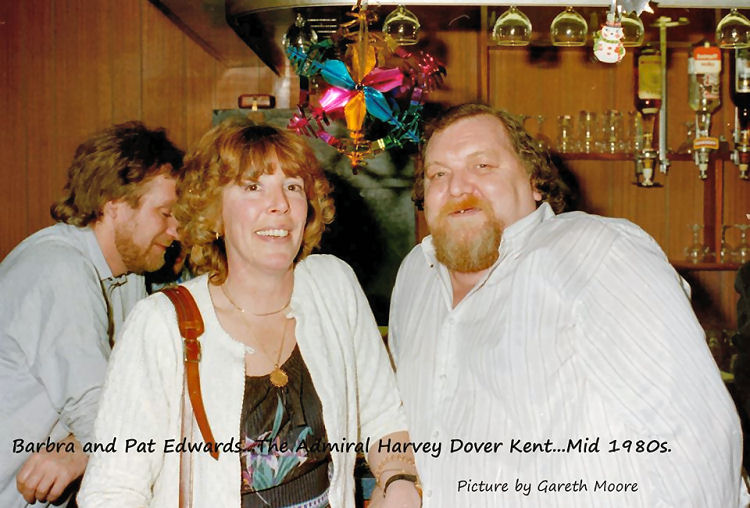
Above photo by Gareth Moore mid 1980s, showing Pat and Barbra Edwards. |
|
From the Rosemary Wells collection.
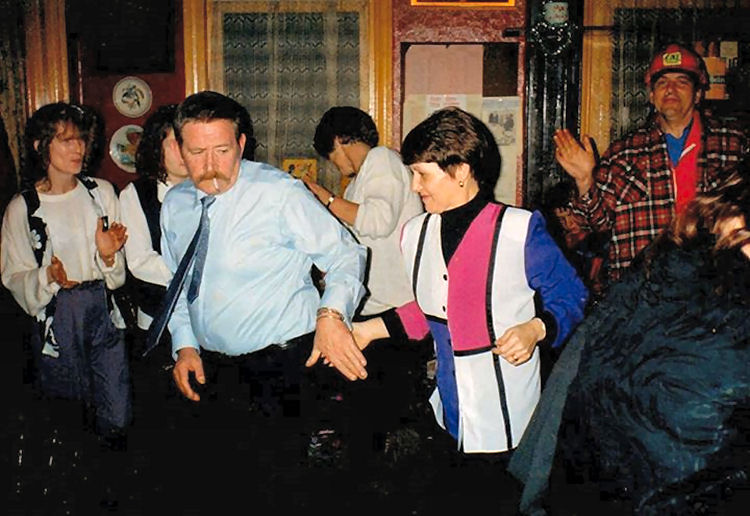
Above photo showing Stan Noseda in 1992 celebration. |
|
From the Rosemary Wells collection.
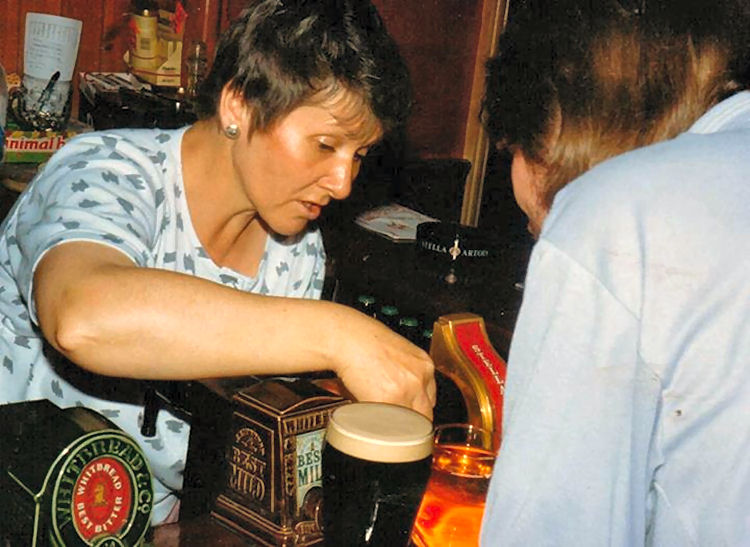
Above photo showing Teresa Club in 1992. |
|
From the Rosemary Wells collection.
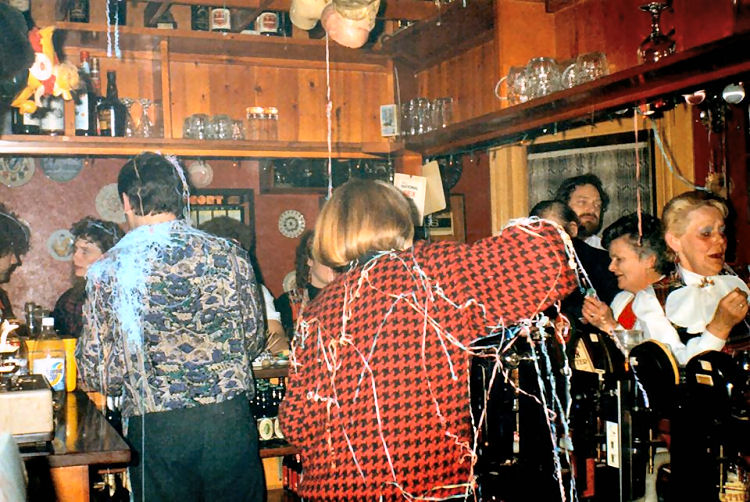
New Year 1992-93 celebrations. |
|
From the Rosemary Wells collection.
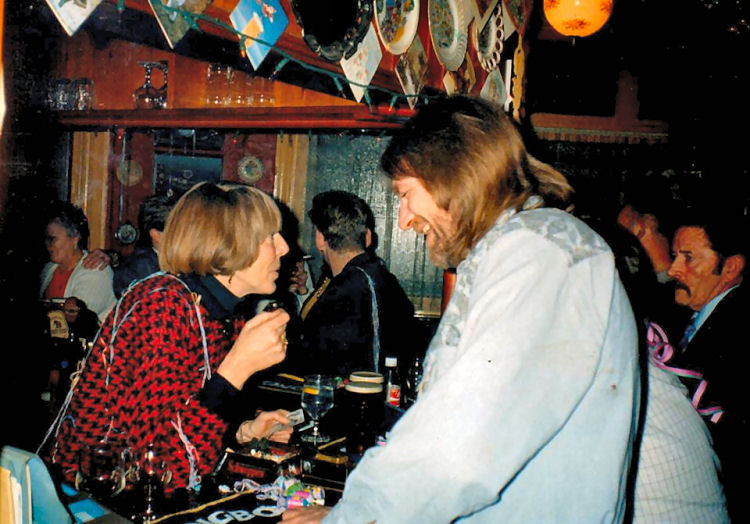
New Year 1992-93 celebrations. Showing landlady Barbara Edwards
serving Barry May in blue shirt. |
|
From the Rosemary Wells collection.
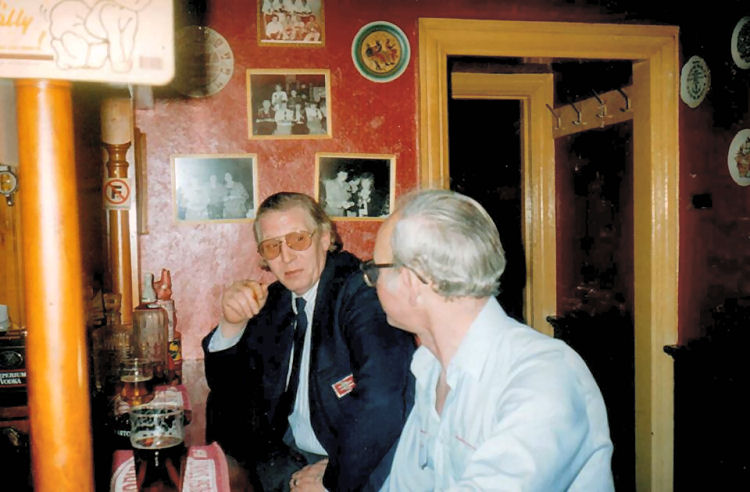
Above photo showing Ted Cole in corner and one other, is that
Tony the butcher? circa 1993. |
|
From the Rosemary Wells collection.
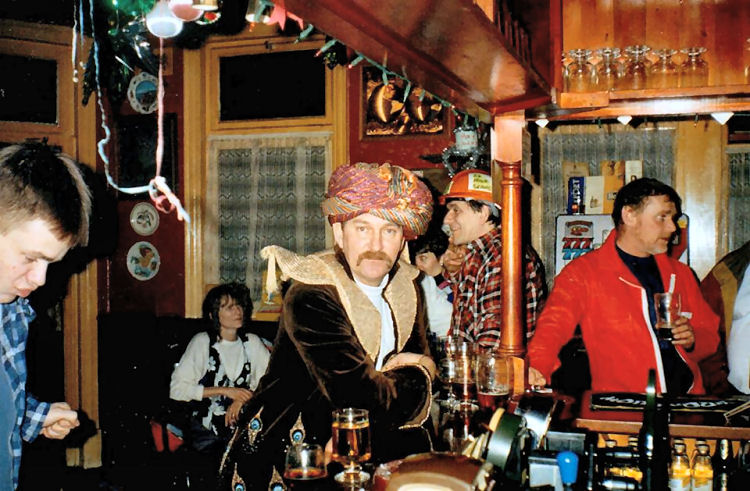
Jimmy Clark 1992-93 New Year. |
|
From the Rosemary Wells collection.
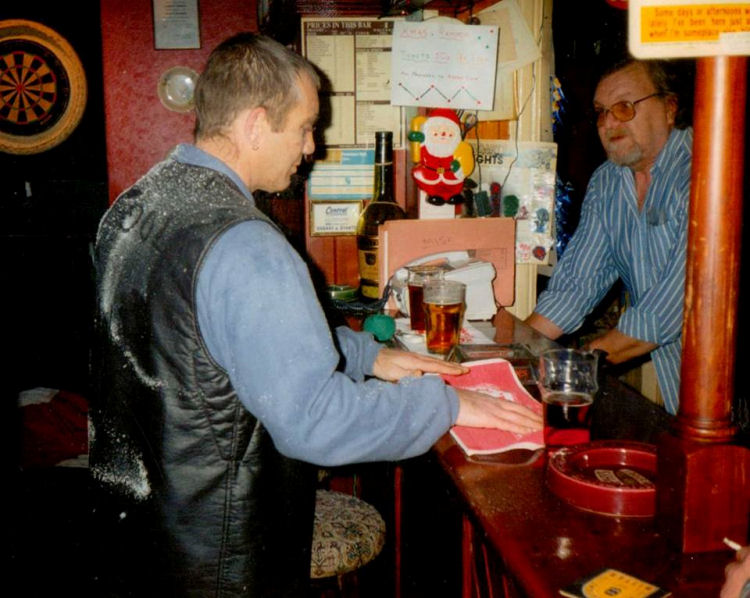
Landlord Pat Edwards is on the right. 1993. |
|
From the Rosemary Wells collection.
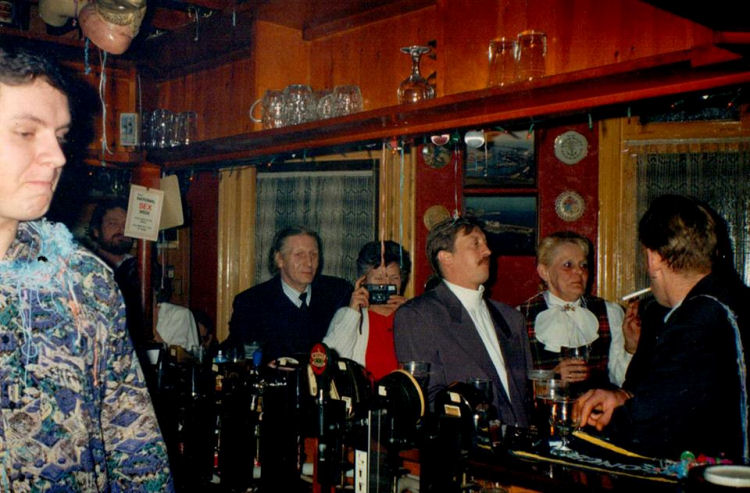
Inside pub 1992-93. |
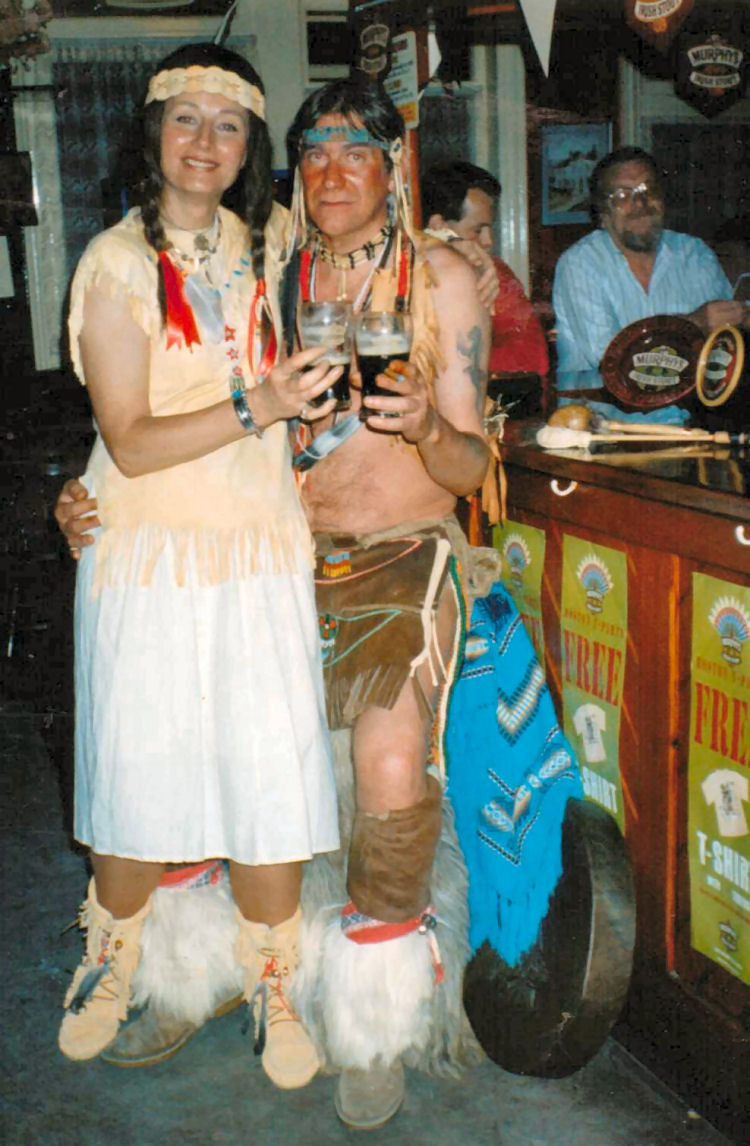
Above photo, 1993, showing Barry May and Rosemary Wells. |
|
From the Rosemary Wells collection.
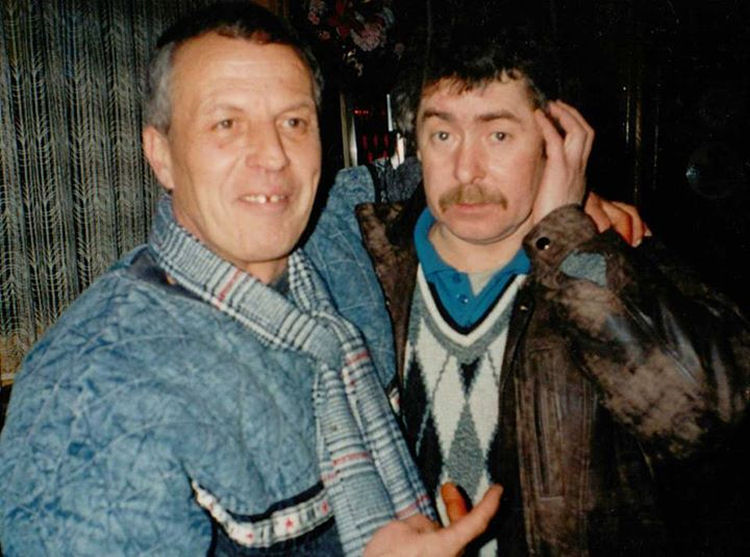
Above photo 1 of locals 1993. |
|
From the Rosemary Wells collection.
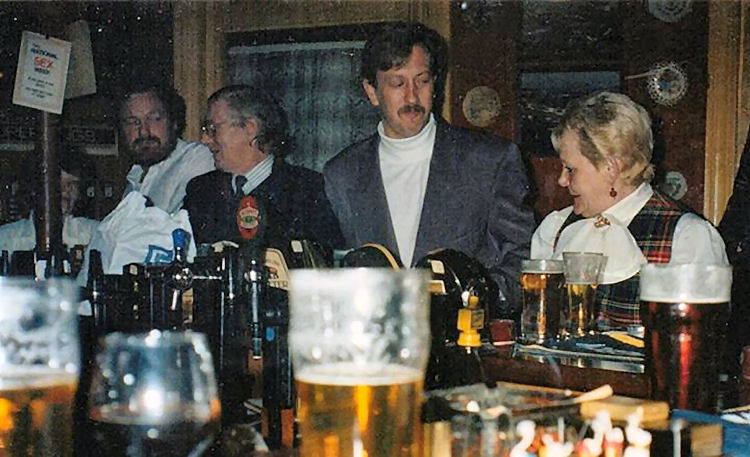
Above photo 2 of locals 1993. |
|
From the Rosemary Wells collection.
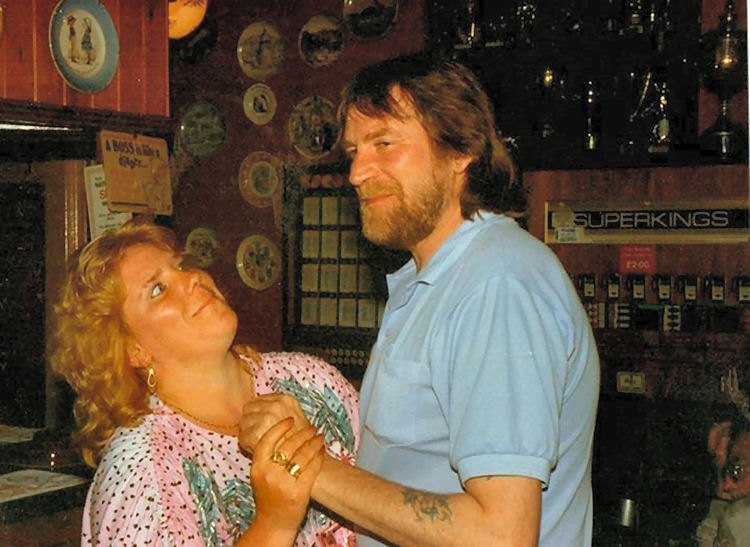
Above photo 3 of locals 1993. |
|
From the Rosemary Wells collection.
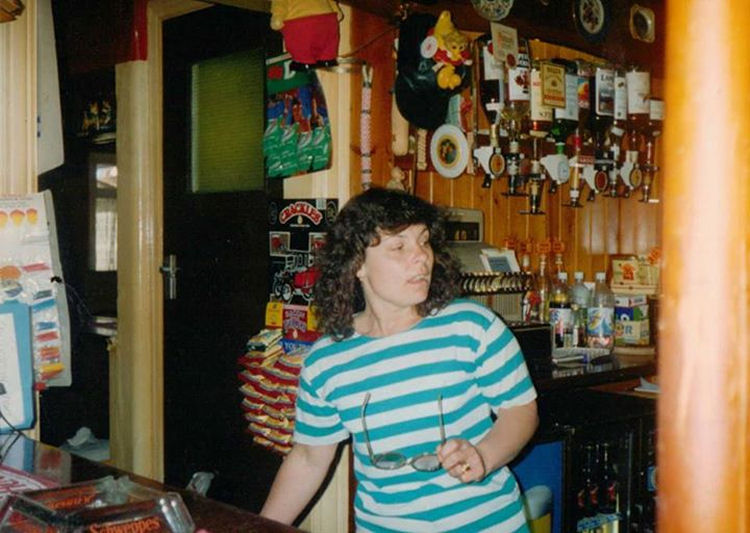
Above photo 4 of locals 1993. |
|
From the Rosemary Wells collection.
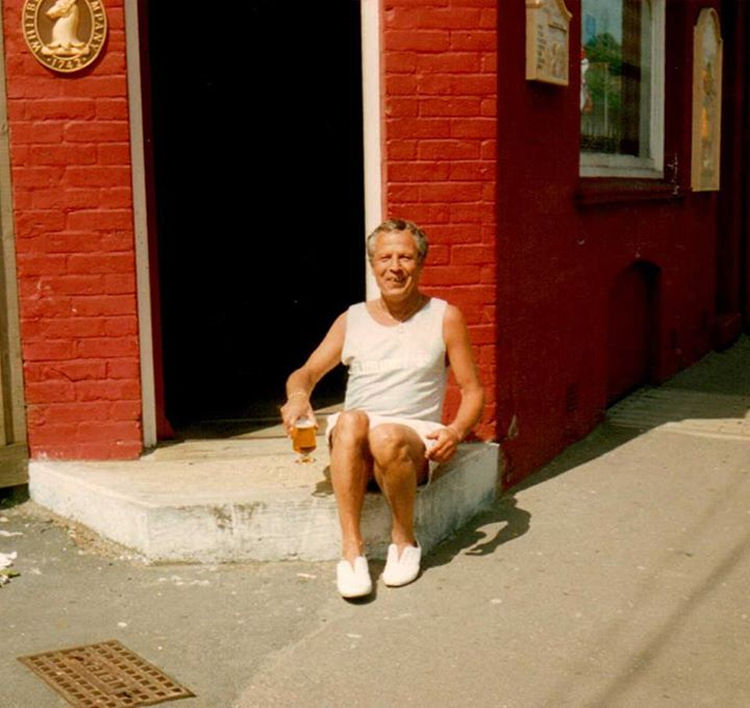
Above photo 5 of locals 1993. |
|
From the Rosemary Wells collection.
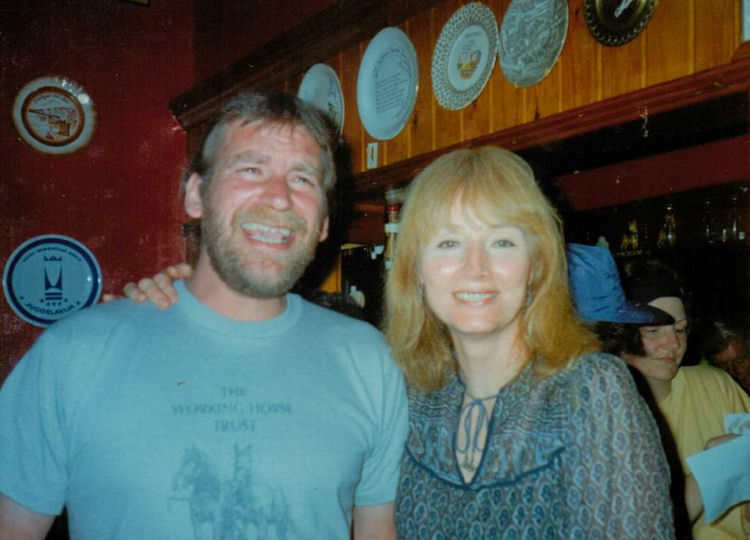
Above photo 6 of locals 1993. |
|
From the Rosemary Wells collection.
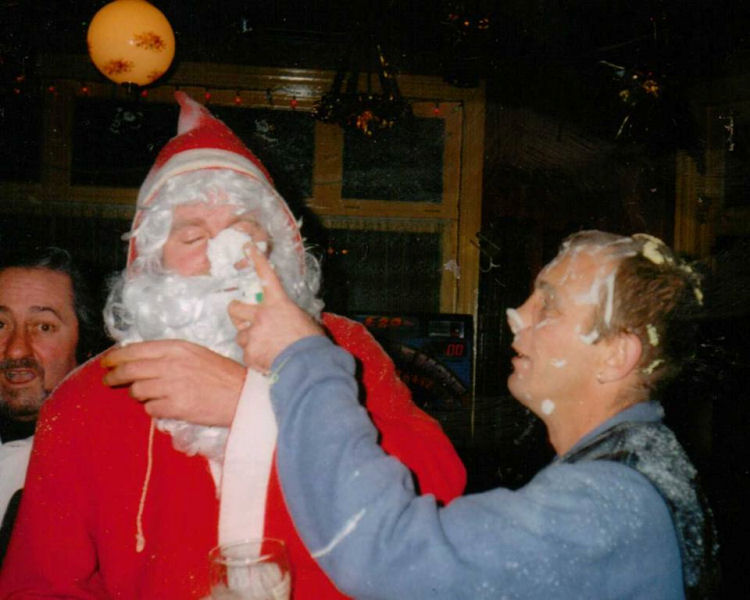
Above photo 7 of locals 1993. |
|
From the Rosemary Wells collection.
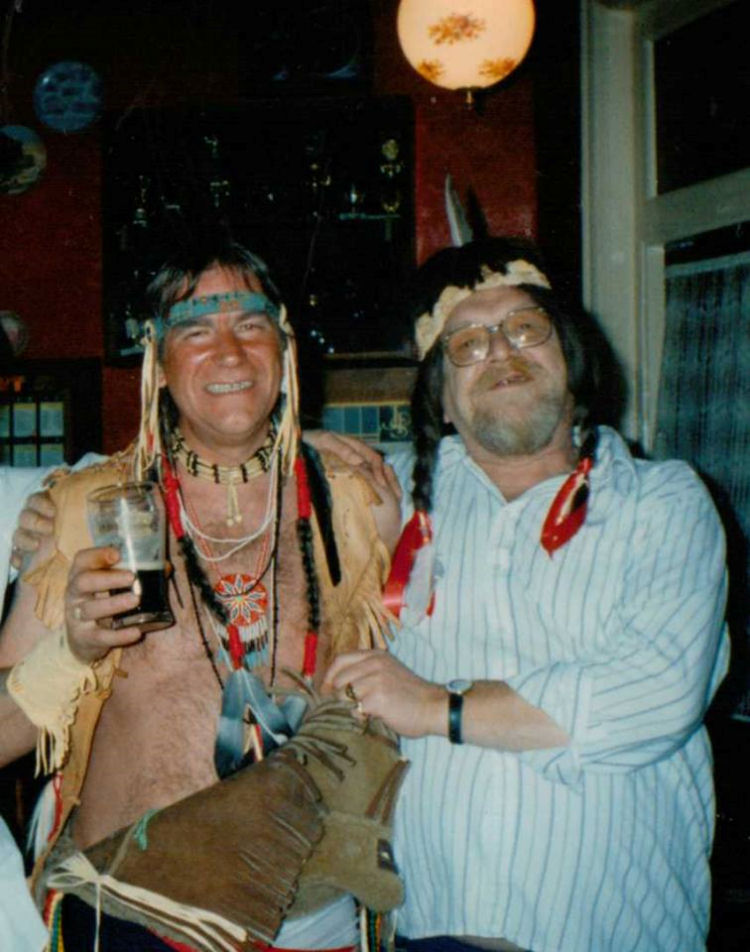
Above photo of locals 8 1993. Landlord Pat Edwards is ion the right. |
|
From the Rosemary Wells collection.
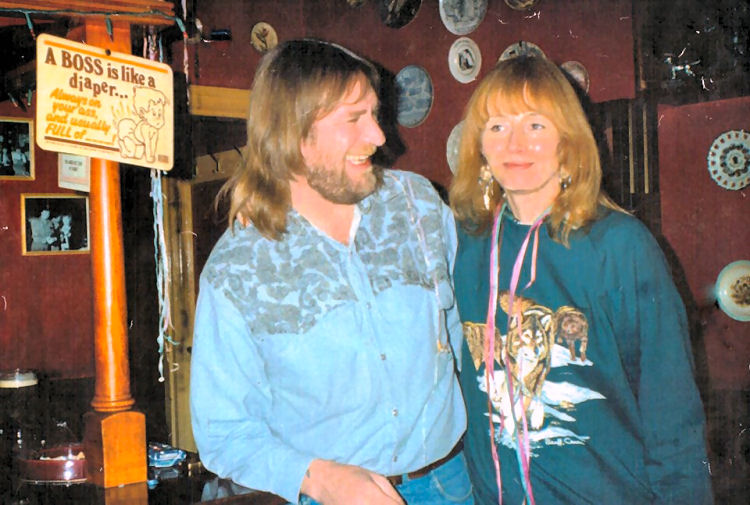
Above photo 9 of locals 1993. |
Fremlins in 1974, later a Whitbread house.
|
From the Folkestone Herald, 5 September, 2013.
By Joe Kasper
TRIBUTE PAID TO WELCOMING HOSTS
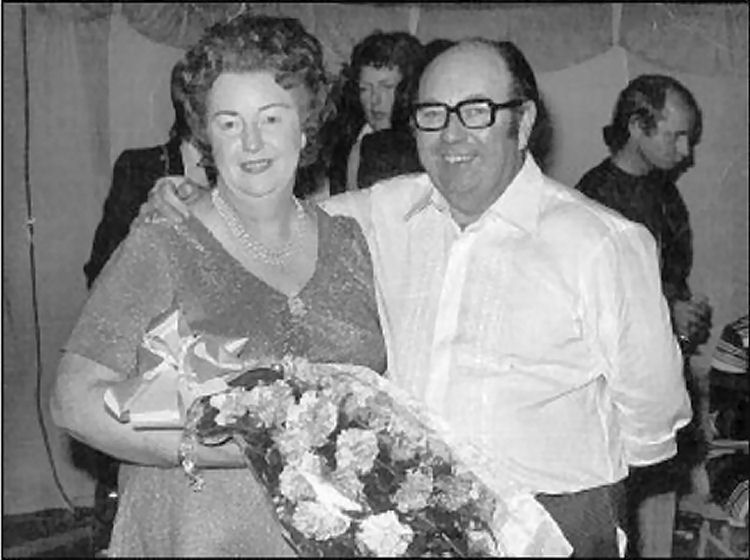
HAPPY COUPLE: Joan and Geoff Biggs.
Landlady's hearty cooking had many fans.
A FORMER landlady who was “loved by her regulars'" and famous for her steak and kidney pie has
died at the age of 86.
Tributes have been paid to Joan Biggs, who ran
pubs in Folkestone, Dover and Ashford with her husband Geoff.
Mrs
Biggs started working as a barmaid in 1938, in her grandfather's Dover
pub, the "Admiral Harvey." There she met her husband-to-be when he
returned from duty in the Second World War, and the couple married in
1949 in Ashford. Mr Biggs died in 1983.
Retired
Mrs Biggs ran the
"Red Cow Inn," on Foord Road, for more than 20 years until she retired
in 1988, after which her daughter Vicky Musk took over.
Mrs Musk said:
“Even after she retired she worked at the pub, helping out with the
cooking.
“In those days there were several businesses nearby and she
would be busy every lunchtime serving regulars from the local
businesses.”
Mrs Biggs had previously been landlady of the "Admiral"
and "Duchess of Kent" in Dover. The "Locomotive Inn" in Ashford and the
"Foresters Arms," Folkestone.
“She did Sunday lunches every week and
was quite famous for her steak and kidney pie,” said Mrs Musk.
“She
was a very popular landlady and loved by all her regular customers.”
Both keen players, Geoff and Joan Biggs ran darts teams as well as a pub
football team.
When she retired, Mrs Biggs moved to Bridge Street,
Folkestone, and then to Hythe Nursing Home in 2007.
She died on August
29, leaving two children, four grandchildren and one great-grandchild.
Mrs Biggs' funeral will be held at Hawkinge Crematorium on Thursday,
September 19, at 12.30pm.
|
I bring you the sad news that Pat Edward died in hospital on Sunday 21st
January 2018, from what is believed to be septicaemia. he had been in
hospital for about a week before his death.
The pub is currently closed and about to be boarded up. I have no further
information regarding its future.
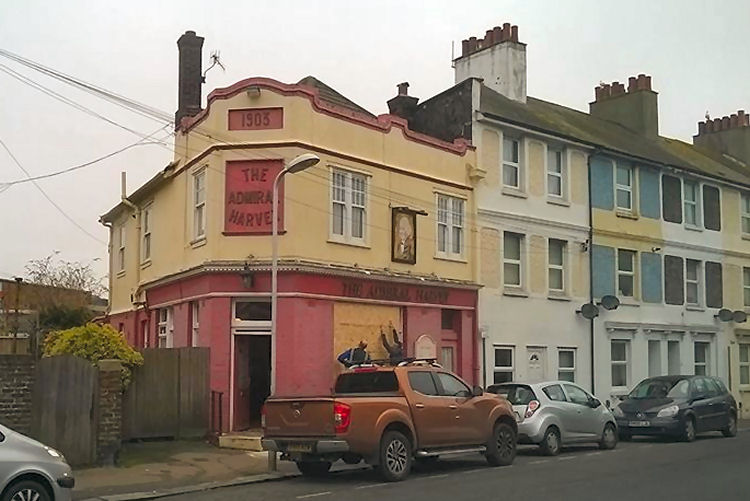
Above photo, February 2018, showing the pub being boarded up. |
Good news is the pub is again open at the end of December 2019, after
renovation.
Sadly closed again in April 2024.
LICENSEE LIST
CLEMENTS Henry 1844+

CARE Thomas 1855-61+ (age 59 in 1861 ) )
 
CARE James 1881+ (age 54 in 1881 ) )

CARE Mrs Naomi 1882

WRIGHT William Henry 1885-Apr/1901

 
COLES William Henry 1901-10 end
   

BOWLAND George William 1910-Aug/11 dec'd (age 52 in 1911 ) )

BOWLAND E Mrs (widow) Aug/1911-Apr/12

 ROGERS Frank Apr/1912-Oct/40 dec'd
ROGERS Frank Apr/1912-Oct/40 dec'd
         
FULLAGER A E Oct/1940 (Brewer's manager)

 HARPER Alfred Harold 1941-Aug/45
HARPER Alfred Harold 1941-Aug/45

BIGGS Frank E Aug/1945-Mar/49
  (Of Barnet)
(Of Barnet)
NICHOLAS John Mar/1949-59
  
BROWN A F 1959-62
TOWNLEY Edwin Kenneth 1964-8 dec'd
TOWNLEY Mrs Gladys L 1968-80 end
 Fremlins
Fremlins
EDWARDS Patrick D 1980-21/Jan/2018 dec'd
???? 2019-20+
 From the Post Office Directory 1855 From the Post Office Directory 1855
 From Melville's Directory 1858 From Melville's Directory 1858
 From the Post Office Directory 1874 From the Post Office Directory 1874
 From the Post Office Directory 1882 From the Post Office Directory 1882
 From the Post Office Directory 1891 From the Post Office Directory 1891
 From the Kelly's Directory 1899 From the Kelly's Directory 1899
 From the Post Office Directory 1901 From the Post Office Directory 1901
 From the Post Office Directory 1903 From the Post Office Directory 1903
 From the Kelly's Directory 1903 From the Kelly's Directory 1903
 From Pikes Dover Blue Book 1909 From Pikes Dover Blue Book 1909
 From the Kelly's Directory 1913 From the Kelly's Directory 1913
 From the Post Office Directory 1913 From the Post Office Directory 1913
 From the Post Office Directory 1918 From the Post Office Directory 1918
 From the Post Office Directory 1922 From the Post Office Directory 1922
 From Pikes Dover Blue Book 1923 From Pikes Dover Blue Book 1923
 From Pikes Dover Blue Book 1924 From Pikes Dover Blue Book 1924
 From Pikes Dover Blue Book 1932-33 From Pikes Dover Blue Book 1932-33
 From Pikes Dover Blue Book 1938-39 From Pikes Dover Blue Book 1938-39
 From the Post Office Directory 1938 From the Post Office Directory 1938
 From Pikes Dover Blue Book 1948-49 From Pikes Dover Blue Book 1948-49
 From the Kelly's Directory 1950 From the Kelly's Directory 1950
 From the Kelly's Directory 1953 From the Kelly's Directory 1953
 From the Kelly's Directory 1956 From the Kelly's Directory 1956
 Library archives 1974 Library archives 1974
 From the Dover Express From the Dover Express
 Census Census
|





























